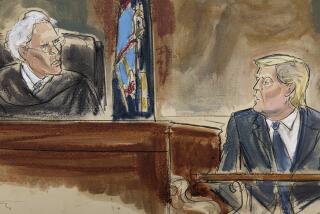Lottery Winner Ordered to Repay Fraud Victims : Courts: Jury says A. Bernard Silver must turn over some of the $10.3 million to the 200 people who lost $26 million with investment firm he managed.
- Share via
On Jan. 6, 1990, A. Bernard Silver hit the jackpot when he won $10.3 million in the state lottery. But on Wednesday the financial news wasn’t so good.
A Santa Monica jury decided that Silver, formerly the chief financial officer of an investment group called the Marshal Plan, and the group’s secretary, Edwin Feigin, must pay $4.38 million in damages to help pay back 200 investors defrauded by the company of $26 million.
Lawyers for the receiver, who was appointed by the state when the business was shut down, say that Silver and Feigin acted irresponsibly in managing the corporation, which brokered mortgages and bought and sold trust deeds, mostly to elderly investors.
The group was closed by the state in 1991 after complaints by investors that dividend checks were bouncing. When officials from the Department of Real Estate investigated, they found that company trust funds had been emptied and that investors had taken company files to track down their investments.
Last year, the corporation’s president, Nell Marshall, who attorneys say used investors’ money to pay for lavish parties and homes in Beverly Hills and Marina del Rey, was found guilty of five counts of grand theft and sentenced to seven years in state prison.
“We never contended that he (Silver) had gotten rich or stolen money,” said attorney Eric Edmunds, who originally sought damages of $13.5 million. “But he left the bank vault open and let a thief inside.”
Attorney Eric Olson, who represented Silver and Feigin, called the verdict outrageous. “I can’t imagine that the jury was seriously listening to what we were all talking about,” he said. Olson also represented Silver’s wife, who was cleared by the jury of any financial wrongdoing.
Olson, who has characterized Silver’s role in the Marshal Plan as mostly ceremonial, said the award will probably be appealed. “I don’t think there’s any evidence that any of these people knew of this wrongdoing,” he said.
For swindled investors, news of the judgment was bittersweet. “I don’t know if that’s enough,” said one retired woman who declined to give her name but said she lost her life savings of $500,000. “I don’t feel it’s a stiff enough penalty.”
Lance Douglas, 46, who lost more than $2 million, said the award is anticlimactic.
The receiver said he hopes most of the award can eventually be given to investors, although he does not know how much each would receive.
More to Read
Inside the business of entertainment
The Wide Shot brings you news, analysis and insights on everything from streaming wars to production — and what it all means for the future.
You may occasionally receive promotional content from the Los Angeles Times.










